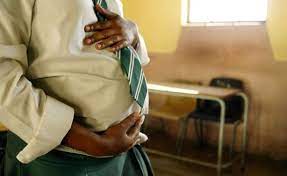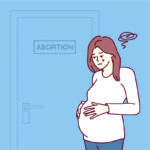Behind the tightly controlled legal framework governing abortion in Lesotho, permitting termination only in cases of rape, incest, or when the pregnant person’s life is at risk, a harrowing crisis unfolds in silence.
Unable to access safe and legal options, many women are turning to unsafe abortion methods, with devastating consequences that extend far beyond physical health.
Even more disturbing, police reports point to a parallel phenomenon: the concealment of births. In some cases, women, desperate and unsupported, have been imprisoned for trying to hide pregnancies and deliveries.
These are not isolated incidents. A 2022 report by the United Nations Population Fund (UNFPA) cast a stark light on the situation in Lesotho’s healthcare facilities.
Titled The State of the World Population, the report revealed that among girls aged 10 to 14, a staggering 35.71 percent of all hospital admissions were related to abortions, an alarming indicator of both early unintended pregnancies and unsafe terminations.
The report, which analysed over 17,000 hospital records from 2019 to 2021, also found that 8.17 percent of abortion-related admissions were among girls aged 15–19, 10.06 percent among women aged 20–24, 15.53 percent among those aged 25–49, and 8.93 percent among adults over 50.
Among women of reproductive age (15–49), 12.35 percent of the 14,410 hospital admissions were due to either induced or spontaneous abortions, suggesting a significant number of unsafe or illegal procedures.
These figures reveal that the issue spans the entire country, affecting both rural and urban communities.
While the UNFPA report did not directly advocate for abortion law reform, it powerfully highlighted the connection between unintended pregnancies and unsafe abortions.
The report called for urgent steps, including eliminating gender-based violence and child marriages, strengthening youth-friendly reproductive health services, promoting comprehensive sexuality education, and addressing the unmet need for family planning
Lesotho’s Penal Code Act of 2010 criminalises abortion, imposing a prison sentence of up to three years on anyone who willingly causes or induces the termination of a pregnancy. While there are limited exceptions, such as in cases of rape, incest, or when the life of the pregnant person is at risk, these require stringent conditions, including a written opinion from a second medical practitioner.
Though the law provides narrow pathways for legal abortion, Lesotho lacks national guidelines on safe abortion practices and post-abortion care, despite abortion being referenced in several national policy documents.
Critics argue that the country’s restrictive abortion laws may conflict with its international obligations under treaties such as the Convention on the Elimination of All Forms of Discrimination Against Women (CEDAW) and the Maputo Protocol, both of which advocate for broader access to safe abortion under specific circumstances.
The intersection of legal restrictions, inadequate sexual health education, and limited access to safe abortion services has created a silent crisis in Lesotho. Many women, often young and vulnerable, are driven to desperate and dangerous measures, risking their health and lives through unsafe procedures.
The criminalisation of abortion and the accompanying stigma have also contributed to the rise in concealed births, further entangling women in legal and social challenges.
Addressing this complex issue demands a holistic approach. Beyond legal reform, there is an urgent need for comprehensive sexuality education that empowers individuals with knowledge about contraception and reproductive health.
Equally important is the strengthening of youth-friendly healthcare services and ensuring access to safe post-abortion care. Ultimately, open and inclusive dialogue, along with a re-evaluation of existing laws in light of both national realities and international human rights standards, is crucial to protecting the health and dignity of women in Lesotho.
‘Mamonica Mokhesi, a healthcare professional concerned about the unsafe methods some women are resorting to, revealed a disturbing trend: the use of unregulated and often dangerous substances, including a drug known as cytotec, which has gained notoriety on social media.
Mokhesi outlined the grave consequences of these unsafe practices, warning that such drugs can cause “severe bleeding, infection, uterine perforation, and potential infertility or even death.”
She explained: “Women undergoing unsafe abortions take whatever they can find, without knowing the effects on their bodies. Often, they ingest excessive doses, immediately putting their lives at risk.”
Driven by desperation, individuals frequently obtain these substances from unregulated sources, unaware of proper dosages or potential drug interactions. “People are so desperate for the abortion to happen that they will take anything from anyone, in any amount,” Mokhesi said.
She drew a stark contrast between regulated medical care and the dangers of black-market practices. “Medication should be administered by healthcare professionals who follow strict precautions.
In the backstreets, however, drugs are given by people with no medical training. Cytotec, for example, is a controlled substance under strict regulation, but it’s now circulating on the black market, we don’t even know how it got there.”
Beyond the physical dangers, Mokhesi emphasised the mental and emotional toll of unsafe abortion. “Women suffer emotional trauma after termination; it affects their mental health, not just their physical well-being,” she said.
Her message is a strong call to action for both women and men to take sexual and reproductive health seriously. “People should focus more on prevention, especially by using family planning methods,” she urged.
For those who have undergone abortions, Mokhesi advised seeking immediate medical attention. “Women should go to health facilities and be honest with healthcare workers so they can get the help they need, instead of staying home and facing worsening complications.”
She reassured women that medical professionals are there to provide support, no matter the circumstances.
Mokhesi concluded by reflecting on the broader societal consequences of unsafe sex and abortion. “Whether abortion is legal or not, it will continue to impact our country,” she said.
Still, her focus remains on education and prevention. “We must prioritise sexual and reproductive health education. The nation must also take responsibility for seeking healthcare services and preventing unwanted pregnancies,” she stressed.
Looking ahead, Mokhesi posed a critical question: Is Lesotho ready for legal abortion? “Even if we woke up tomorrow and abortion was legal, are we prepared in terms of infrastructure? No. Are we ready religiously? No.” These, she argued, are the complex challenges that need attention even before any legal change can be meaningfully implemented.
Her immediate concern, however, is clear: protecting women from the dangerous path of unsafe abortion through education, prevention, and access to proper healthcare.
Summary
- While there are limited exceptions, such as in cases of rape, incest, or when the life of the pregnant person is at risk, these require stringent conditions, including a written opinion from a second medical practitioner.
- Critics argue that the country’s restrictive abortion laws may conflict with its international obligations under treaties such as the Convention on the Elimination of All Forms of Discrimination Against Women (CEDAW) and the Maputo Protocol, both of which advocate for broader access to safe abortion under specific circumstances.
- Open and inclusive dialogue, along with a re-evaluation of existing laws in light of both national realities and international human rights standards, is crucial to protecting the health and dignity of women in Lesotho.

Ntsoaki Motaung is an award-winning health journalist from Lesotho, specializing in community health stories with a focus on sexual and reproductive health and rights, as well as HIV. She has contributed to platforms like “Be in the KNOW,” highlighting issues such as the exclusion of people with disabilities from HIV prevention efforts in Lesotho.
In addition to her journalism, Ntsoaki serves as the Country Coordinator for the Regional Media Action Plan Support Network (REMAPSEN). She is also a 2023 CPHIA Journalism Fellow.









